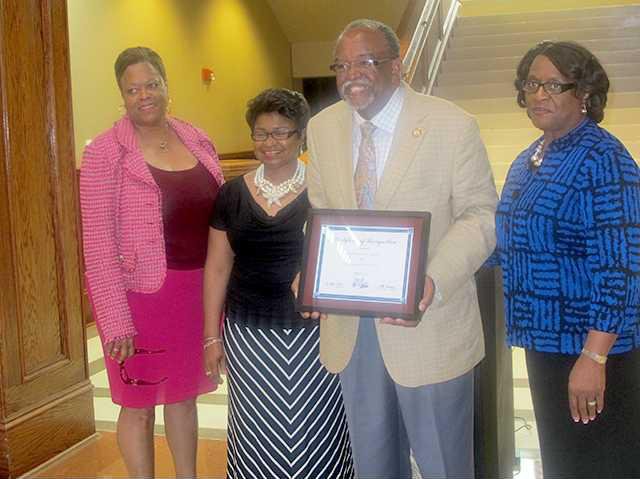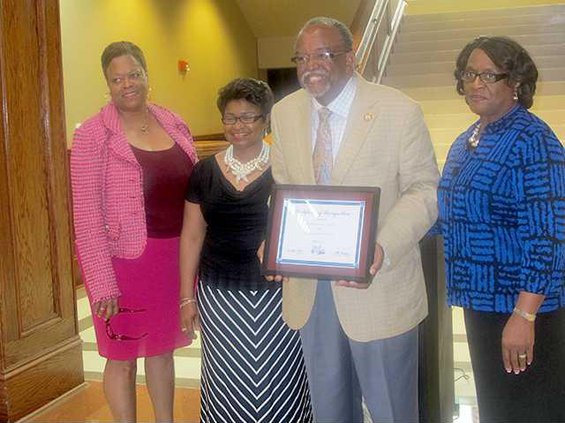State Rep. Al Williams, D-Midway, gave a mixed assessment on the recently concluded 2015 legislative session’s handing of education matters during the Liberty County Board of Education meeting last week.
Before the Tuesday meeting, the board conducted a reception to honor Williams for being named the Georgia Association of Educators’ 2015 Legislator of the Year.
During the meeting, Williams first discussed fiscal issues.
“There is a $7.95 billion proposal for education in this state,” he said. “We have ongoing austerity cuts since 2003. If you do the numbers, we’ve cut about $10 billion out of public education. We will be at the level of funding we were at in 2002 for K-12 in Georgia. It means that we’ll still have large classrooms and will have fewer school systems that don’t have 180 (school) days. We’ve laid off 9,000 teachers since 2009, but students continue to develop and grow — we’re doing more with a lot less. Now we have $314 million (more) this year, and that’s a down payment against a $1 billion austerity cut.”
Williams said the austerity cuts have been “devastating” for public schools. He noted that the Quality Basic Education formula, which sets minimum state-funding standards for different areas in public education, such as the teacher-to-student ratio and the number of support staff per school based on student population, has not been fully funded in many years.
“We’re falling seriously behind on education,” he said. “But, unfortunately, public education is not the darling of everyone’s eye anymore.”
He did praise local school boards’ efforts to seek alternate funding sources to help make up for the state cuts, but he said it makes the state look bad. He did applaud his colleagues in the General Assembly for stopping a proposal in Gov. Nathan Deal’s budget that would have eliminated health benefits for non-certified school employees, such as bus drivers and cafeteria workers.
“Sometimes it’s so easy to overlook the ‘least amongst us,’ as we like to refer to them, but they play a vital role,” Williams said. “It would have saved $130 million, but we need to find some other place to save that money. A lot of school bus drivers and workers work for the insurance, sometimes with no other insurance in the house.”
Williams called the Opportunity School District, which Deal recently signed into law, “dangerous legislation.” If voters approve the referendum that will be on the ballot in 2016, the measure would give the governor the authority to sweep into a school district and fire an entire staff, eliminate a principal and assign a hand-picked superintendent to run Georgia’s lowest-performing schools — up to 20 each year — starting in the 2017-18 school year.
“I’m always worried about that much authority being put in any one person’s hands,” Williams said.
He said he told Deal, “You have one term left. Who is going to be the next governor, and how will they handle this type of authority?”
Instead, Williams said, that the authority to run schools should continue to be in the hands of local school boards. He noted that there is not a school in Liberty County on the list to be considered an Opportunity School, but that nearby counties do have schools that would be subject to state takeover.
Regarding the Common Core Georgia Performance Standards, Williams said it may not be the best, but there has to be a way to measure success and set high standards.
“Students in Liberty County should be able to compete with students from any school district in America,” he said. “That means we can’t have one bar for California and another bar for Georgia. We’re in a global society now.”
The transportation bill, which Deal also recently signed into law, drew much criticism, mainly for implementing new fuel taxes to fund it. But Williams said it was needed.
“We need safe, good roads in order to transport students to and from school. We were starting to fall behind,” Williams said. “We needed new money. So this bill will pump $900 million new dollars into roads and bridges over the first 12 months, then possibly $1.2 billion for the next year. All of it is dedicated to roads and bridges.”
One bill that didn’t get as much attention was the End to Cyberbullying Act, which also passed.
“I didn’t realize how serious this problem was until we finally had testimony,” Williams said. “There have been suicides as a result from this bullying. The new law will help ensure that students experience a safe learning environment.”
Williams said one of his proudest moments of legislation was eliminating the Georgia High School Graduation Test as a requirement to receive a high-school diploma. He said that 8,000 people in Georgia who had been blocked by that test are now able to get their diplomas.
Lawmaker updates BoE on education law


Sign up for our e-newsletters